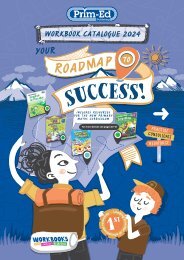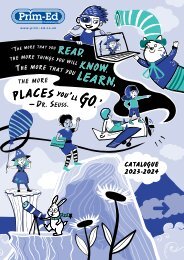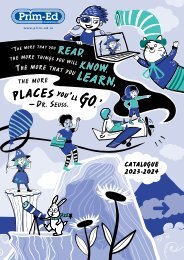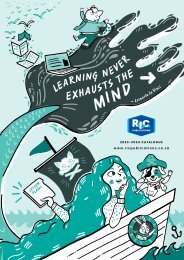RIC-0667 Aboriginal Cult 5-6
Create successful ePaper yourself
Turn your PDF publications into a flip-book with our unique Google optimized e-Paper software.
Rules and Responsibilities<br />
Rules<br />
The Lost Girl<br />
(pages 89 – 90)<br />
Indicator:<br />
Rules and Responsibilities<br />
Teachers Notes<br />
Identifies that a child’s family is the first place where rules and<br />
responsibilities are learnt.<br />
This section aims to enhance students’ awareness of the responsibility of family<br />
groups and explain how children learn from their family about rules and<br />
responsibilities.<br />
In all cultures children learn from their family. It is the first unit in which they<br />
learn. From learning to walk and talk, to learning morals and values, the family<br />
unit teaches children these at different stages of their lives.<br />
To traditional <strong>Aboriginal</strong> people, children learning to behave correctly at an early<br />
age was very important. <strong>Aboriginal</strong> children needed to learn rules and behaviours<br />
to ensure their safety within an often harsh environment. The main means by<br />
which <strong>Aboriginal</strong> people taught their children were stories and hands-on experiences.<br />
Within <strong>Aboriginal</strong> societies, different family members are responsible for teaching<br />
children rules and social behaviours. The <strong>Aboriginal</strong> family unit is often extended.<br />
Grandparents tell the children traditional stories. In many cases there can be aunts,<br />
uncles, grandparents as well as parents all living in the one house. Aunts and uncles<br />
in traditional <strong>Aboriginal</strong> societies were responsible for disciplining the children.<br />
Parents taught children values and how to behave socially.<br />
<strong>Aboriginal</strong> people used stories to teach their children. <strong>Aboriginal</strong> children were<br />
taught not to wander away from their family. This was important for traditional<br />
<strong>Aboriginal</strong> people to instill into their children at an early age because of the<br />
environment. Respect for elders and the importance of sharing were other rules<br />
learnt by <strong>Aboriginal</strong> children.<br />
In some <strong>Aboriginal</strong> societies, children were taught not to be cruel to anything<br />
because they were always being watched by the Great Spirits. Another important<br />
rule <strong>Aboriginal</strong> children were taught was not to be greedy. Gluttony meant you<br />
were likely to get sick as a result. This also encouraged sharing among children,<br />
which was an important custom within <strong>Aboriginal</strong> societies. There were also rules<br />
regarding eating. For instance, before you ate a goanna, you were required to break<br />
its tail, or it was believed you would get sick.<br />
©R.I.C. Publications<br />
Low Resolution Images<br />
Display Copy<br />
• Talk about rules and their importance.<br />
• Tell the students that rules are used everywhere. Do they know some places<br />
where rules are used? Accept all answers and discuss them.<br />
• Make students aware that traditional <strong>Aboriginal</strong> people also lived by rules,<br />
even though they were different from those we have today. They were still<br />
necessary for the smooth running of their lives.<br />
• You may wish to give the students the opportunity to play a quick game,<br />
emphasising how they need to follow a set of rules.<br />
• Discuss the worksheet ‘Rules’ with the students and complete.<br />
• Discuss the worksheet ‘The Lost Girl’ with the students. They could offer<br />
suggestions as to why she became lost and broke an important rule by<br />
wandering away from her family.<br />
88 Australian <strong>Aboriginal</strong> <strong>Cult</strong>ure R.I.C. Publications www.ricgroup.com.au<br />
ISBN 978-1-86311-807-1


















